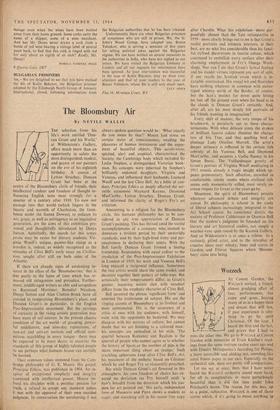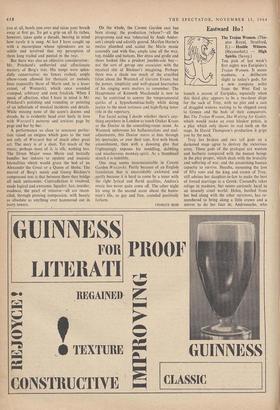Wozzeck
let me say at once, then, that I have never heard the Wozzec-k orchestra sound more lucid, for all its complexities, or more perturbingly beautiful than it did this time under John Pritchard's baton. The reason for this was, up to a point, subjective. Wozzeck is one of those scores which, if it's going to mean anything to
you at all, bowls you over and takes your breath away at first go. To get a grip on all its riches, however, takes quite a decade, bearing in mind how rarely it is sung. At last I have caught up with a masterpiece whose splendours are so subtle and involved that my perception of them long trailed and panted in the rear.
But there was also an objective consideration: Mr. Pritchard's unflurried and affectionate mastery of Berg's text. His tempi were splen- didly conservative; no fences rushed; ample elbow-room allowed for thematic or melodic lines (especially those of Marie and, to a lesser extent, of Wozzeck), which once sounded cramped, arbitrary and even freakish. When I speak of affection, what I have in mind is Mr. Pritchard's polishing and rounding or pointing of an infinitude of musical incidents and details. While missing none of the score's dooms and dreads, he is evidently head over heels in love with Wozzeck's patterns and textures page by page and bar by bar.
A performance so close to sensuous perfec- tion raised an enigma which goes to the root not only of Wozzeck but of much other great art. The story is of a slum. Yet much of the music, perhaps most of it, is silk, nothing less. The Drum Major woos Marie and bestially bundles her indoors to opulent and majestic bitonalities which would grace the bed of an Alexander the Great or a Queen of Sheba. The marvel of Berg's music and Georg Btichner's compressed text is that between them they bridge all such antinomies. Contradiction is resolved, made logical and awesome. Squalor, lust, murder, madness, the pearl of remorse—all are recon- ciled, through piercing compassion, with beauty as absolute as anything ever hammered out in ivory towers.
On the whole, the Covent Garden cast has been strong; the production (whose?—all the programme said was 'rehearsed by Ande Ander- son') simple and adroitly geared. Marilyn Home's mezzo plumbed and scaled the Marie music assuredly and with fine, ample tone all the way, top, middle and bottom. Her dress and girdle and shoes looked like a prudent jumble-sale buy— not the sort of get-up one associates with the mystical shit of Btichner's imagining. Perhaps there was a shade too much of the crucified felon about the Wozzeck of Geraint Evans; but the power, simplicity and well-spaced heartaches of his singing were matters to remember. The Hauptmann of Kenneth Macdonald is new to me; he contrived to convey the temperamental quirks of a hypochondriac-bully while doing justice to the most tortuous and high-flying tenor role in the repertory.
For facial acting I doubt whether there's any- thing anywhere in London to touch Otakar Kraus as the Doctor in the consulting-room scene. As Wozzeck unbosoms his hallucinations and mal- adjustments, this Doctor stares at him through his spectacles, or over their tops, first with blank astonishment, then with a dawning glee that frighteningly exposes his meddling, dabbling and mischievous monkey-spirit. As a thumbnail sketch it is indelible.
One snag seems insurmountable in Covent Garden Wozzecks. Partly because of an English translation that is unavoidably awkward and partly because it is hard to come by a tenor with the right lyrical and florid qualities, Andres's music has never quite come off. The other night his song in the second scene about the hunts- man's life, so gay and free, sounded positively forlorn.
CI-IARLES REID











































 Previous page
Previous page